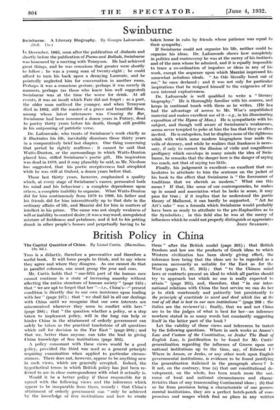Swinburne
IN December, 1865, soon after the publication of Atalanta and shortly before the publication of Poems and Ballads, Swinburne was honoured by a meeting with Tennyson. He had achieved great things, and he was conscious that greater were shortly to follow ; he was a young man of twenty-eight ; he could afford to turn his back upon a decaying Laureate, and he pointedly neglected him for conversation in another room. Perhaps it was a conscious gesture, perhaps it was merely ill manners, perhaps (as those who knew him well suggested) Swinburne was at the time the worse for drink. At all events, it was an insult which Fate did not forget : as a poet, the older man outlived the younger, and when Tennyson died in 1892, still the master of a grave and beautiful Muse, among whose latest utterances was Crossing the Bar, Swinburne had been immured a dozen years in Putney, dead to poetry thirty years before his death, though still prolific in his outpouring of patriotic verse.
Dr. Lafourcade, who treats of Swinburne's work chiefly as it illustrates his life, inevitably dismisses those thirty years in a comparatively brief last chapter. One thing concerning that period he rightly reaffirms : it cannot be said that Watts-Dunton, or the surroundings in which Watts-Dunton placed him, stifled Swinburne's poetic gift. His inspiration was dead in 1879, and it may plausibly be said, as Mr. Nicolson has suggested, that his poetic receptiveness had atrophied while he was still at Oxford, a dozen years before that.
Those last thirty years, however, emphasized a quality which, at every stage of Swinburne's career, permeated both his mind and his behaviour : a complete dependence upon others, a complete inability to organize. What Watts-Dunton did for him continuously from 1879 to 1909, his father and his friends did for him intermittently up to that date in the ordinary affairs of life, and Mazzini did for him in matters of intellect in his prime. The cause was not simply weakness of will or inability to control desire; it was a wayward, unregulated mixture of feebleness and petulance, and it led to his getting drunk in other people's houses and perpetually having to be
taken home in cabs by friends whose patience was equal to their sympathy. If Swinburne could not organize his life, neither could he organize his ideas. Dr. Lafourcade shows how completely in polities and controversy he was at the mercy of his instincts and of the men whom he admired, and it is equally impossible to trace a co-ordination of impulses or ideas in any of his work, except the sequence upon which Mazzini impressed his somewhat nebulous ideals. " An Ode literally burst out of me," he once declared : and it was not only for particular inspirations that he resigned himself to the exigencies of his own internal explosiveness.
Dr. Lafourcade is well qualified to write a " literary biography." He is thoroughly familiar with his sources, and keeps in continual touch with them as he writes. (He has had the advantage of access to Mr. Wise's unpublished material and makes excellent use of it—e.g., in his illuminating exposition of the Hymn of Man.) Ile is sympathetic with his subject, and though well aware of Swinburne's weaknesses, seems never tempted to poke at him the fun that they so often invited. He is outspoken, but he displays none of the righteous relish with which some modern biographers tear aside the veils of decency, and while he realizes that frankness is neces- sary, if only to correct the illusion of virile and magnificent profligacy which envelops in many minds the idea of Swin- burne, he remarks that the danger here is the danger of saying too much, not that of saying too little.
Finally, his judgement is excellent—so excellent that one hesitates to attribute to him the sentence on the jacket of his book to the effect that Swinburne is " the forerunner of traditions that we cherish as modern." What can this mean ? If that, like some of our contemporaries, he makes up in sound and association what he lacks in sense, it may pass for true ; if it implies that he understood the poetic theory of Mallarme, it can hardly be supported. " Art for Art's sake " was a formula which Swinburne would probably have been as ready to attribute to the pre-Raphaelites as to the Symbolists ; in this field also he was at the mercy of influences which he could not properly distinguish or appreciate.
JOHN SPARROW.




































 Previous page
Previous page